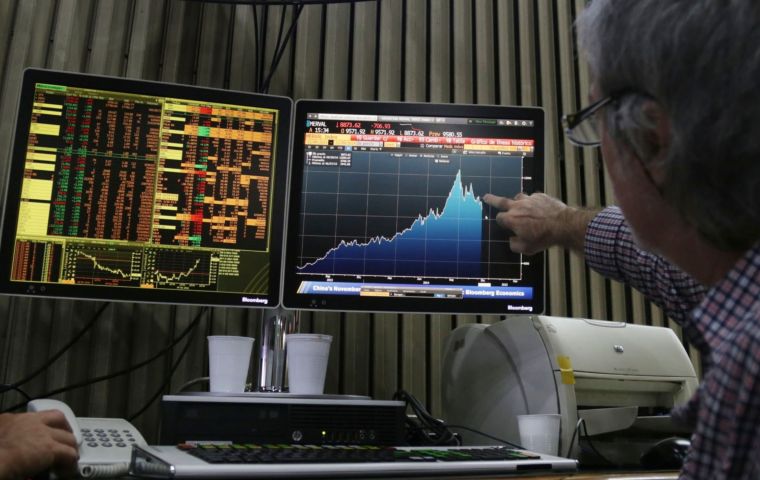MercoPress. South Atlantic News Agency
Argentina's country risk rises to 1,417 points; investors fear economic measures
 In addition to the financial problems faced by Argentina, which is negotiating a new agreement with the IMF, there are fears of new confinements in Europe
In addition to the financial problems faced by Argentina, which is negotiating a new agreement with the IMF, there are fears of new confinements in Europe Argentina's country risk reached a maximum of 1,417 basis points on Tuesday, reflecting investors' fears about the behavior of the domestic economy and doubts about the international situation of the markets, traders told Reuters.
They said that the financial problems faced by Argentina, which is negotiating with the International Monetary Fund (IMF) a new agreement for unpaid debt, are compounded by fears of new confinements in Europe due to the increase in cases of COVID-19.
“The political and economic uncertainty continues to weigh on the country, amid fears of the health crisis and possible decisions that could have implications for the country's economy and impact on its fiscal deficit. Added to this is the absence of new signs regarding negotiations with the IMF that could take several months,” said Gustavo Ber, director of the consulting firm Estudio Ber.
The markets are also watching to see if the second round of elections for the United States Federal Senate on Tuesday in Georgia will allow the Democrats to win two seats in the Senate and alter what they see as a delicate political balance in Washington. A Democratic victory would mean an additional fiscal stimulus, days before Joe Biden's presidential inauguration.
* The Argentine risk prepared by JP.Morgan bank rose 17 units, to 1,417 basis points by 17:00 local time (2000 GMT), the highest since the beginning of last December.
* Over-the-counter bonds averaged a decline of 0.5%, with 'Bonar 29' leading the drop with 0.6%.
* The exchange rate CCL at the opening rose 3.3% and immediately fell to 1.8%, which undoubtedly shows that there is an official seller of bonds at 40% of the issue value which is 100%,“ explained a market agent to Reuters agency on condition of anonymity.
* The agent affirmed that ”Argentine bonds yield 16% or more, almost double that of countries like Pakistan, Cameroon or Iraq (...) While (that from the government) they say that among the achievements is having resolved the issue of the debt“.
* The S&P Merval stock exchange in Buenos Aires was left with an improvement of 1.7%, at the provisional closing of 51,594.73 units, in line with the rise of Argentine ADRs in New York.
* The wholesale peso lost 0.13%, to 84.80/84.81 per dollar, with the intervention of the central bank since the opening and a slightly favorable balance in its exchange participation, said operators.
* ”In a scenario of very low volume of operations, the usual private sources of the market estimated that the central bank had a small balance in favor on Tuesday because of its intervention (...) The volume in the wholesale segment is the lowest since January of last year,” said Gustavo Quintana, operator of PR Corredores de Cambio.
* In the alternative markets, the peso showed a decrease of 1.1% to 143.9 per dollar in the stock market 'Contado con Liquidación' (CCL), a loss of 0.8% to 143.5 per unit in the 'dollar MEP' of the Electronic Open Market (MAE) and a rise of 3.1% to 161 per dollar in the informal band.
* International corn buyers from Argentina could punish the country with fewer purchases due to the uncertainty generated by the recent suspension of cereal exports announced by the government, said agro-exporters. The measure comes at a time when soybeans are around $500 a ton, the maximum in six years.
With information from Reuters




Top Comments
Disclaimer & comment rulesCommenting for this story is now closed.
If you have a Facebook account, become a fan and comment on our Facebook Page!